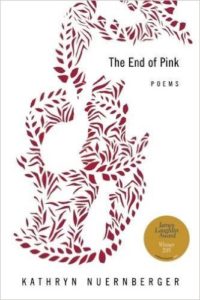Last year, The End of Pink by Kathryn Nuernberger won the prestigious James Laughlin Award of the Academy of American Poets, given for a distinguished second collection by a poet. It’s easy to see why.
The collection is marked by imagination and creativity, involving different poetry forms, mythic characters, historical figures, folklore, science, and even relationships. Reading it is akin to a roller coaster ride—unexpected twists and turns, quick ascents, and sometimes thrilling (and terrifying) descents.
The titles of the individual poems give an idea of what’s happening. “Bat Boy Washed Up Onshore,” “The Saint Girl Takes in Strays” (one of several “Saint Girl” poems, as arresting as they are disconcerting), and “Peter, Raised by Wolves (1726)” are only a few examples of the poet’s roving imagination.
A peacock or two make appearances in several of the poems.
My First Peacock

a wasn’t, a fantail of wasn’ts,
nevered feathers upon evered
falling all over the grass.
When a green peacock landed
on my shoulder to shimmy
its iridescent trills, everyone asked
if it was my first peacock.
It’s impolite to speak of the translucent tail
hanging down behind your ear
like a piece of hair brushed back
in a moment lost to thought.
To make the well-wishers uncomfortably shift
their weight by saying, No,
first I had this white peacock.
Because it’s not anyone’s fault
who can’t see the glaucoma
eyes on mist plumes
that don’t see them back.
So I say, Yes. And I say
how very emerald joy is,
how very leafed with lapis and gilding.

Kathryn Nuernberger
Nuernberger’s thematic range in these 38 poems is astonishing. Jacques Derrida is here, as is an 1838 prospectus to investors on electricity and volcanic power. Or you can read about P.T. Barnum’s mermaid exhibition. And Rene Descartes. And the birds of Ohio. And that Saint Girl, with her strays and her tortures, her isochronal error, her dying and going to heaven (where, inevitably, she causes problems), and even her simple opening and closing of a window, but perhaps not in that order.
Nuernberger teaches creative writing at the University of Central Missouri. Her first poetry collection, Rag & Bone, won the 2010 Elixir Press Antivenom Poetry Prize (how’s that for a name?). At the university, she also serves as the director of Pleiades Press.
The End of Pink is wild, it’s exuberant, and it sits out there at the very frontier of imagination. It’s a remarkable collection.
Photo by Donnie Nunley, Creative Commons, via Flickr. Post by Glynn Young, author of the novels Dancing Priest and A Light Shining, and Poetry at Work.
__________________________

“I require all our incoming poetry students—in the MFA I direct—to buy and read this book.”
—Jeanetta Calhoun Mish
- Longfellow’s “Paul Revere’s Ride”: Creating a National Legend - April 17, 2025
- Poets and Poems: Katie Kalisz and “Flu Season” - April 15, 2025
- Poets and Poems: Michelle Ortega and “When You Ask Me, Why Paris?” - April 10, 2025

Laura Lynn Brown says
Sometimes, I think, we can judge a book by its cover. And sometimes by the table of contents. Judging by these few poem titles you’ve offered, I’d say this is someone whose mind I want to look inside through her poems. Thanks for introducing us to her work, Glynn.
Glynn says
And she lives here in Missouri! Thanks for the comment, Laura.
Maureen says
This is a poet who clearly enjoys playing with words and colors and the relationship between vision and seeing (imagining).
Glynn says
While reading the collection, I had the distinct impression that she was having a great deal of fun. Thanks, Maureen!
Bethany R. says
Fascinating post. I enjoyed reading her featured poem and seeing her use words with such pliability. This is sticking with me: “And I say/ how very emerald joy is”
Glynn says
And “how very leafed with lapis and gilding!” Thanks for the comment, Bethany.